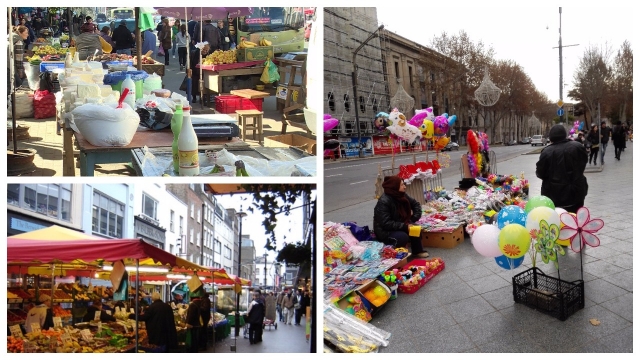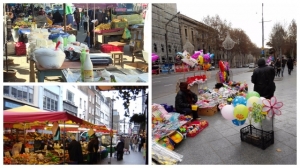Yet Another (Questionable) Farewell to Street Vendors?
The ISET Economist, a blog about economics in Georgia and the South Caucasus by the International School of Economics at TSU (ISET)
Tbilisi residents have already experienced a fair number of cycles in street vending regulations where local authorities tolerate, then regulate, and then evict street vendors. These cycles correspond with economic trends and election cycles, starting in 2006, when street vending was declared illegal by the Tbilisi Government and the first attempts were made to enforce the ban.
Just recently, the Tbilisi Mayor’s Office restarted its efforts to restrict trading in the streets of Tbilisi, claiming that illegal stalls in the busiest places prevent movement on the sidewalks and disturb the local population and tourists with noise and unsanitary conditions.
While many welcome such efforts from the local government, their economic and social consequences need to be thoroughly evaluated and considered in order to develop economically and socially sustainable long-term solutions.
Street trading is pervasive across the globe, especially in developing countries. It provides an important source of earnings for the unemployed in urban areas, as well as a source of relatively inexpensive goods and services for financially vulnerable citizens. Even though it is the most visible segment of the urban informal economy, the accurate number of vendors and their contribution to the economy is virtually unknown and is still in flux.
Street vending markets provides access to paid work for groups with poor educational or vocational qualifications, and/or those who have been out of formal work for an extended period of time. Informal paid work can have a positive role in peoples’ lives in preventing them from falling into abject poverty, and developing their confidence and skills to build social capital (Travers, 2000). In developing countries, half to three quarters of the non-agricultural labor force participates in the informal sector; street vending constitutes quite a high portion (nearly 65%) of that work force (Martha Alter Chen and Marilyn Carr, 2001). In addition, street vending provides for important economic opportunities for women due to its flexibility. Women can more easily combine street vending with life events such as having children, and childcare, as well as other household duties. Hence, it is not surprising to see that women dominate street vending in Tbilisi and beyond.
Vendors in the informal market can either sell their products in bazaars (specially segregated places for trading where vendors pay daily fees for stalls), or in the streets for free. Some of the vendors choose to trade in the streets, because they do not have to pay a fee for permission to trade (stall fees), and they have more flexibility in choosing the best place to sell their goods and services (in terms of consumer activities). Moreover, they can charge higher prices than in bazaars, since some consumers’ willingness to pay is higher due to their desire not to go inside a given bazaar and spend time searching for needed goods. They are willing to pay higher prices because they save time, and vendors take advantage of this fact. But it is not that street vendors necessarily earn more than off-street vendors. Street vendors also incur costs such as having their merchandise confiscated – a risk to which off-street enterprises are not subject to, as well as daily fees levied or bribes demanded in exchange for their use of public space.
Therefore, one might argue that this kind of market allocation is stable and optimal, because both parties find relevant consumers for their goods and services, and consumers are able to self-select in differentiated markets. Street and off-street vendors can exercise their economic rights, and, possibly, resources are optimally allocated.
However, street-trading is not a typical market activity for one simple reason: the economic activity does not take place on private property, but on public property. Not surprisingly, therefore, individual economic rights clash with collective rights in these public spaces. Opponents of street vendors argue that collective rights are violated when street vendors appropriate public space for their own use, impede the free flow of pedestrians and motorized traffic, and congest transportation networks. Temporary structures like sheds and kiosks, unsanitary conditions, noise, and little regard for the intrinsic beauty and suitability of vending in certain public spaces deter citizens from enjoying the impacted public spaces. In this view, governments must defend public space from such intrusions by strictly regulating or even outlawing street vending.
Outlawing street vending was a decision made by the Georgian government many years ago, but its enforcement in many ways has been costly, inconsistent and characterized by political cycles. Incidentally or not, the recent renewal of efforts coincides with the beginning of the new political cycle, when Georgian politicians have much less incentive for political populism. Georgian citizens engaged in this economic activity represent a significant share of Georgian constituents, and we might argue that they exert significant influence on political decisions during elections, which makes us suspect that the solution offered by the government will only last up until the next important elections.
An alternative strategy that could be considered by the Tbilisi Government is to treat street vending as an essential, viable feature in economic governance. Street vending, as has been argued, contributes to the economic and social wellbeing of a society by offering dependable retail outlets for a wide range of affordable goods. Because street vendors sell affordable goods in small quantities, they offer low-income customers access to otherwise unaffordable goods. It is mostly poor public management that generates problems of congestion and pollution, which could be avoided by well designed, innovative and inclusive policies which many countries (e.g. Greece, Italy and Spain) have effectively embraced.











